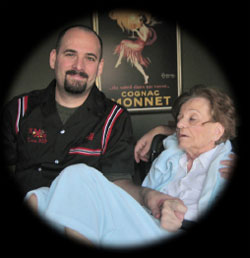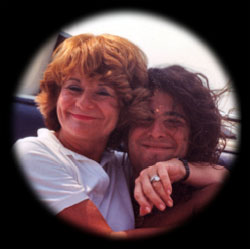Ilene Veltman
by Jeff Veltman
How do you say goodbye to your mom?
On May 16, 2007, I had to say goodbye to mine. Ilene Veltman was only 71 years old. I am her youngest child and I was the last person to say goodbye to her on her final day. When we look back at photos we see early signs of the disease around 1999, with a noticeable difference in her eyes, which we later found out is called ‘sun setting’. It is possible that she may have had PSP even earlier, which means she lived with this disease for about 10-15% of her life. For the majority of her life, however, she was a healthy, happy, independent, optimistic, and vibrant woman. To witness the degenerative effects of PSP on someone of her nature was undoubtedly the most challenging thing I have ever had to experience. In her final days, she was unable to feed herself, go to the bathroom alone, talk, or even move. In the very end, she couldn’t even get out of bed.
I admit it is challenging to see the “glass half full” with PSP. However, we were fortunate in some regards. One thing about PSP is you are afforded many chances to say your goodbyes. Another thing about witnessing this disease, as it was when my wife had cancer, is that it puts things into perspective. Daily life has a way of taking your eye off the ball, causing you to miss the things that are most important. For me, it is those I love; my family and friends. It’s all too easy to get wrapped up in life’s daily problems – making sure you can pay your bills, keeping a business afloat, dealing with an irrational three year old child, among other challenges. It’s these daily complications that make us forget how important it is to take that giant step back and look at the big picture, instead of stressing out. I know this is easier said than done, but when we’re confronted with an illness like PSP, it gives you that wake up call you need. We get way too comfortable in our lives and tend to forget how good we have it. I should also mention that we were very fortunate to have had superb, in-house nursing care. In the end, my mom had around-the-clock care, with even two nurses per shift on certain days. In addition, we had a very caring and helpful staff from the hospice center. Lastly, my mom had regular visits from a massage therapist who practiced a progressive style of Asian message therapy. I know this is not something everyone can afford; we do consider ourselves very fortunate to have had this type of care.
It took a long time to reach the true diagnosis. At the beginning, the doctors thought it was frontal lobe disorder which is another way of saying they didn’t know what the problem was. Then, the doctors said it was a Parkinsonian-like disease. When they finally diagnosed my mom with PSP, it was (to some extent) a relief to have a name for my mom’s illness, even though there wasn’t a cure. At one point, my mom underwent surgery to relieve pressure on her spinal chord. After the surgery, for a single day, there was a noticeable difference. She was talking like she used to and she said her head felt “clearer”. It was a wonderful feeling as if we were awakening from a nightmare. Unfortunately, it only lasted one day.

There were many symptoms we noticed in the early days of this illness that, at first, we couldn’t explain. At the time, my mom was overly agitated when it came to making plans. She called us on the phone a lot. We thought it was because our grandfather was dying of cancer. Her father also noticed something was different about her but we all just thought it was stress. She also began to have problems with her balance and started to fall backwards. It was around this time that my folks decided to move out of the house I grew up in since it had two floors. They moved into a ranch-style apartment which made it much easier for her to get around. Over time, it became increasingly challenging for Mom to communicate. For a while, she was ‘parroting’ everything we said. Towards the end, Mom merely made guttural, moan-like sounds, which we’d soon become accustomed to. From time to time, she would use single words so the nurses would know what she needed. One of the more difficult aspects of PSP was that my mom clearly understood what was going on around her; she just couldn’t express herself. Every now and again she would laugh at a joke. Granted, her humor became debased and she found toilet humor to be the funniest, but we didn’t care; it was always nice to have a good laugh. My mom’s inability to communicate was something that deeply troubled me. I would lay awake at night thinking about how hard it must be for her to lose her speech. It took me a while, but I finally came up with something that was really quite simple and effective. It was a binary method of communication, similar to how computers ‘talk’. We would simply ask her a ‘yes’ or ‘no’ question. If the answer was ‘yes’ then she would squeeze our finger once. If the answer was ‘no’, then she wouldn’t squeeze. This actually worked quite well for a little while.
Now that my mom is gone, there are two things that plague me, both of which have solutions. One is that I find myself asking if there was more I should have done. I visited her every Friday afternoon with our three year old son and also every Sunday with the family. Recently, a very good friend of ours lost his step-father to Parkinson’s disease. We both agreed that we couldn’t tear ourselves up by asking these questions. We did as much as we could and had to leave it at that. Another thing I find disturbing is that the general public is unaware of PSP; even some physicians are unaware of this disease and many cases are diagnosed as Parkinson’s disease. More funding is needed for research to help find the cause, treatment, and cure of PSP. In addition, we need to educate the general public about this disease so that they can become pro-active about finding the correct diagnosis for their loved ones, particularly when the traditional treatments for a misdiagnosed disease are not effective.
With so few people in the United States having PSP, you can imagine our surprise to find out that the mother of one of my oldest friends was also diagnosed with the disease. She’s only had it for two years, at this point. My friend and I grew up only six blocks from one another. I have often wondered if there is something locally in the environment that may have contributed to their shared illness. The last thing I’d like to say before I end this letter is how my family shares a common feeling about my mom’s passing. Many of us have conflicted emotions now that she is gone. On one hand, we are relieved that she is no longer suffering from this debilitating illness, but we also feel guilty about feeling this way. We sorely miss her, as anyone would when you lose a dear member of your family.
Please join me in supporting the programs and services of CurePSP. With your help, we can continue to educate communities about progressive supranuclear palsy, support those affected by this disease and find the cause, treatment, and cure for PSP.
Thank you for letting me share my story with you in memory of my mother – Ilene Veltman.
